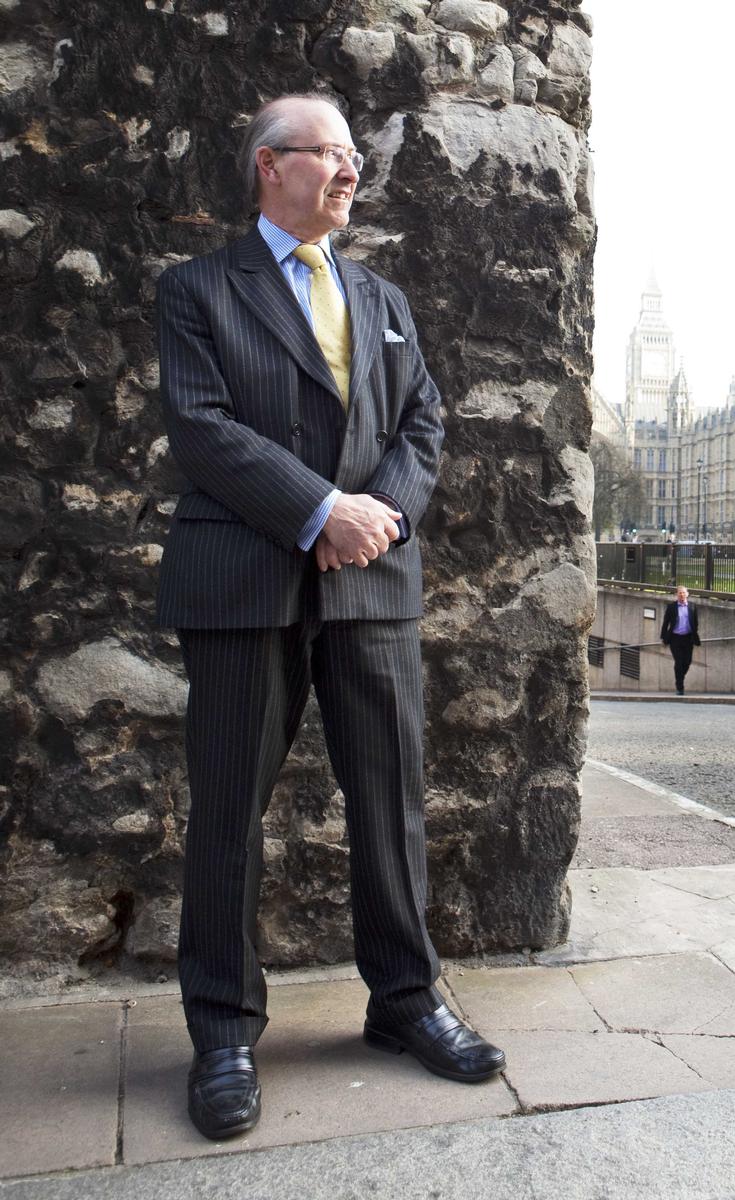Peer pressure
The government’s welfare reforms faced a fierce opponent in Lord Richard Best as he battled to protect society’s poorest people. Carl Brown meets the staunch housing advocate to find out what drives him and what’s next on his agenda

In a small, cramped office within a stone’s throw of Big Ben toils a man who has done more than anyone else to challenge the coalition government’s welfare reforms.
It’s here that on many an evening, Richard Best, crossbench peer and lifelong housing figurehead, can be found scrutinising legislation, and where necessary, plotting ways to challenge the government. If you thought the House of Lords was all about fine wine and free lunches, think again.
Lord Best has come to the fore in recent months as the driving force behind attempts by the House of Lords to force changes to the controversial Welfare Reform Bill before it received royal assent in early March.
He tirelessly co-ordinated attempts to make the bill fairer, and inflicted defeat after defeat on the government, most notably over the controversial ‘bedroom tax’ for under-occupying social tenants.
On top of this the 66-year-old grandfather is also spearheading the Social Mobility Social Housing task force - a group of MPs and peers who are gathering evidence from housing experts in order to explore barriers to social mobility.
Inside Housing caught up with Lord Best in a rare quiet moment on a bright, sunny morning at Westminster to find out what makes him tick, and why he remains convinced the Welfare Reform Act will cause hardship for thousands of people.
The peer has repeatedly insisted that those on housing benefit are the ‘poorest people around by definition’. ‘If you cut the support they get that can be very damaging,’ he says.
‘I tried to persuade my colleagues in the House of Lords that, although deficit reduction is a huge priority, it should not be at the expense of people who are so very poor,’ he recalls of the five months he spent opposing the changes, which included a total benefits cap and cuts to local housing allowance.
Lord Best, who at first makes his comments about welfare reform in a slow, precise manner, knows what he is talking about. He has, after all, had an impressive housing career. After working for the British Churches Housing Trust, helping to set up small housing associations, he became the chief executive of the National Federation of Housing Associations - now the National Housing Federation - in 1973 at the tender age of 28. Since then he has been the director at the Joseph Rowntree Foundation, as well as continuing to serve as president of the Local Government Association and chair of Hanover Housing Association.
This experience, combined with his status as a crossbencher - ‘not crossdresser, make sure you get that down right,’ Lord Best chuckles - means he is perfectly placed to independently scrutinise government policy from a position of authority.
Bedroom tax battle
The most high-profile of Lord Best’s battles over welfare concerned his attempts to alter plans for a penalty for under-occupying social housing tenants, popularly referred to as the ‘bedroom tax’. The policy will result in an estimated 670,000 households with a spare room being docked an average of £14 a week from their housing benefit, rising to £25 a week for those with two rooms.
Lord Best disagrees with the tax in principle and initially wanted to push an amendment calling for tenants to be allowed a spare room.
‘There are millions of reasons why it’s good to have an extra room,’ he insists. ‘[For instance] the daughter that comes to help you if you are middle aged and just come out of hospital, the separated father who wants children to come to stay for the weekend.’
In the end he was forced to compromise to gain the support of peers - and the amendment he finally tabled focused on defeating the government’s argument that the penalty could reduce overcrowding by encouraging under-occupying tenants of working age to move, thus freeing up properties deemed too large for them.
The amendment restricted the tax to those households which have more than one spare room and where suitable alternative accommodation is available, and it was voted through the Lords by a huge margin of 68 votes.
‘I hoped it would persuade the Liberal Democrats in the [House of] Commons that they should use the muscle they have within the coalition to say to the government “this is a step too far”.’

Source: Tim Foster
But MPs overruled the amendment by a margin of 42 votes - 10 Lib Dems switched sides, if just 22 more had done the same the government would have been defeated.
Undeterred, Lord Best fought on, tabling another amendment to exclude war widows, disabled people, foster carers and those not required to work - such as carers for severely disabled people. Again, peers shared Lord Best’s concerns and backed the amendment, but it was shot down in the Commons.
‘They cannot work,’ he says, speaking more quickly as his passion for the subject becomes clear. ‘Making work pay is not a relevant thing for them. They are just going to have to take this money out of other benefits, there is nowhere else to go. Yes, they could use their savings as [housing minister Grant Shapps] suggested, but how many people have got savings that wouldn’t run out pretty quickly?
‘You could take in lodgers, but this is a totally impractical suggestion,’ he says scornfully, giving Inside Housing a taste of what Steve Howlett, chief executive of Peabody, describes as Lord Best’s ‘iron fist in a velvet glove’ - a steely determination behind the charm.
Lord Best’s determination to alter the reforms won him plaudits across the housing sector. Accent Housing Group went as far as emailing a picture to Inside Housing of Lord Best in the middle of a love heart emblazoned with the words ‘love you’.
When we mention this to the object of their affection he laughs in his affable, bumbling manner. ‘Yes, [that’s] very, very kind, well, yes, quite. It’s head-banging stuff though; it is really difficult to really make an impact.’
Ultimately, Lord Best says welfare minister Lord David Freud was constrained by the Treasury’s desire to make savings. ‘He wants to save £2 billion and every measure I propose that erodes that he’s going to oppose.’
Partial success
Although Lord Best failed to change the under-occupancy policy there was some pay-off - he did extract a pledge from Lord Freud to commission an independent review of its impact, and also secured £30 million of discretionary payments to help households caring for foster children and those where homes have been adapted for a disabled person.
However, with characteristic alertness, it was Lord Best who realised this £30 million was not additional money, but funded by increasing the average bedroom tax for tenants with one spare room from £13 to £14 per week.
So did Lord Best feel his efforts on the bedroom tax were successful? ‘No,’ he says simply. ‘It was worth getting what we got at the end, it wasn’t a complete waste of time, but this is clearly not enough and there is going to be huge disruption. This will rebound on social landlords.
‘In the end it means less money either in the hands of individuals to spend in the areas where there is a lot of council housing … or less for social housing for regeneration and new homes [as rent arrears rise].’
Lord Best is pinning his hopes on the independent study of the bedroom tax Lord Freud has promised - the date of which is yet to be announced - and says he hopes the review’s findings will provide an opportunity to make what he calls ‘in-flight corrections’ to the policy, such as making more discretionary payments available for certain groups of people or those living in particular geographical areas.
As chair of the all party parliamentary group on housing and care, he believes building high-quality retirement housing that is attractive to older people wishing to downsize is the real key to tackling under-occupation.
The bedroom tax is, of course, just one area of the coalition’s welfare reforms in which Lord Best has been active. In January 2011, he persuaded Lord Freud to commission an independent review of the impact of cuts to local housing allowance. It has now been carried out by the University of Oxford, the Institute for Fiscal Studies, Ipsos Mori and Sheffield Hallam University, and the first results are due to be published within the next three months.
‘If it [the government] doesn’t come clean, I shall be asking questions in parliament,’ says Lord Best firmly.
Lord Best believes the total benefits cap of £26,000 a year, due to come in next April, will lead to an ‘exodus’ of people from high-priced areas. When the Welfare Reform Bill was working its way through parliament, he pushed for a six-month grace period, during which a person losing their job could still claim benefits without being affected by the cap. Lord Freud ended up going one step further, announcing a nine-month grace period. Did this surprise Lord Best?
‘Err, yes,’ he says. ‘But these are the so-called “hard-working” families by definition, people who are in work and lose their job, they are people for whom the government has special sympathy and so they are going to be given a longer opportunity to pick themselves up,’ he explains.
Lord Best also attempted to alter the coalition’s plan to pay benefit direct to tenants and helped win a victory of sorts when, in September 2011, the government announced a set of year-long pilot projects, due to begin in June, to test scenarios under which payment can be switched back to the landlord.
He reveals that Lord Freud ‘absolutely understands’ the argument that direct payment could threaten landlords’ income streams, but is keen claimants learn how to budget. But he points out that for those that are unable to work, such as seriously disabled people, direct payments ‘could simply be a curse’ as they could struggle to handle a lot of cash.
When pushed, Lord Best concedes that the policy could work in some cases. ‘If you are on the edge of work this can get you more work-ready,’ he says, before adding, ‘but how many people are in that category?’
Legal aid battle
Now that the Welfare Reform Act is on the statute books, Lord Best has turned his attention to other battles. He unsuccessfully tried to amend the Legal Aid Bill, which will remove legal aid for housing and welfare advice.
The government has accepted that a case in court can still be fought with legal aid, but Lord Best won’t claim this as a win - he dismisses it as ‘silly’, insisting that it is outside the courtroom that tenants need help negotiating with benefits officers. He believes this policy will eventually be reversed as policymakers realise court time is being wasted. ‘This is going to be one of those “I told you so” ones,’ he says with a smile.
Lord Best is steadfastly independent. He likes being a crossbencher because it means he can table amendments of his choosing and is not subject to party discipline.
To his mind, politics and policy are two very different things - he’s not interested in ‘politics’, he states.
Unsurprisingly, he is against the idea of a wholly elected House of Lords, believing the upper chamber, comprising 200 crossbench peers, plays a crucial role in scrutinising and amending legislation. ‘We’ve already got an elected chamber - who wants to vote for another bunch to do the same kind of thing?’ he asks.
Draft proposals for a smaller chamber of 300 members, which is wholly or mainly elected, have been published by the Cabinet Office, and the government is expected to announce a bill to reform the House of Lords in the Queen’s speech on 12 May. This means the sector’s strongest advocate’s time in parliament could be limited.
‘It is quite likely that whatever the reforms are I won’t still be here,’ he says. ‘In which case I’d better pack in now everything I can possibly do that might be useful, as I might not get a chance in the future.’
For many in the housing sector, the hope is that Lord Best will be able to continue fighting on their behalf for a good while yet.
The SMASH task force
The social mobility and social housing task force, headed by Lord Richard Best, is bringing together housing professionals, academics and others to examine how inhibitors to mobility can be reduced. In the government’s strategy, published last year, social mobility was described as a measure of how free people are to improve their position in society.
The SMASH task force organised by Inside Housing and the Chartered Institute of Housing aims to quantify what landlords are doing to promote social mobility.
The task force has met on three occasions, each time focusing on a different aspect: employment; education, skills and training; and social capital and community contribution.
Lord Best will present its findings at the Chartered Institute of Housing’s conference in Manchester in June.
‘We’ve heard how the work of social housing providers can have positive outcomes for residents. I hope our report will spread the work,’ he says.
Best behaviour: Lord Best’s social conscience
The crossbench peer’s energy and determination to alter welfare reforms have won him plaudits, but why does he care so much?
A self-confessed ‘child of the 1960s’, the young Richard Best travelled around India, taught in Pakistan, went to San Francisco for the summer of love in 1967, and studied social administration - a mix of sociology, law and politics - at Nottingham University. But two experiences shaped his early interest in housing.
The first, which sparked his interest in rural housing, was witnessing the phenomenon of second-home owners displacing the population where he grew up in Dorset.
The second was watching the Ken Loach film Cathy Came Home, which he found ‘absolutely riveting’ and which awakened his interest in homelessness.
‘What’s different with housing is that it has a very nice pragmatic component,’ he explains.
‘You have actual physical buildings as well as the ever-changing personalities and human stories, so you end up with things that last and are solid.’
Simply the best
‘He is an inspirational leader - I learned so much from him, and he has a high level of energy and commitment. He is charming but very bright and able to convince people of the right way of doing things.’
Steve Howlett, chief executive, Peabody
‘Being ennobled hasn’t changed Richard in the slightest. He is a thoroughly decent man who champions for a better deal for people in housing need. He brings his experience, wisdom and an ability to persuade politicians to do the right thing to his role in the House of Lords.’
Robin Lawler, president, Chartered Insititute of Housing
‘He did a terrific job in the Lords on welfare reform, particularly on the bedroom tax. There are very few people in politics who really understand housing and how the different bits fit together. Richard has always been very clear in expressing what is important.’
David Orr, chief executive, National Housing Federation









